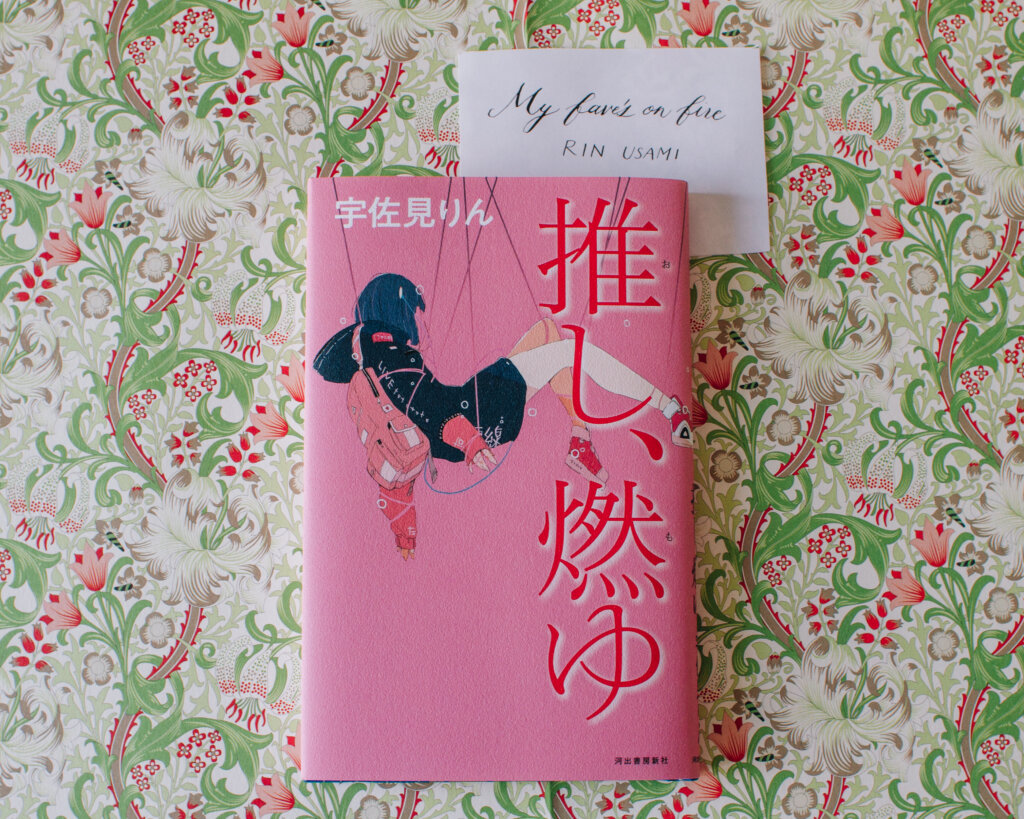
‘Oshi’ is such a difficult term to understand, unless you have your own ‘oshi’ to support too. It’s used to describe the situation where you have a public figure which you are supporting as a fan, such as a member of an idol group or an actor; it’s a term commonly used on SNS. It’s very difficult to translate into English, and I feel it’s rather hard to explain what it means in Japanese too. When this book won the famous Akutagawa-prize in Japan (similar to the Booker prize in the UK, a big literary award), a whole wider generation came to term with this mysterious concept ‘Oshi’, and it caused a bit of confusion. For example, the older generation had never heard of the term, while the younger generation tended to use it all the time.
「推し」って、すごく世代を選ぶというか、使う人と使わない人と、両極端な言葉だなと感じます。(英語に訳すのもすごく難しい!)でも、「推し」と呼べる人がいる人にとって、この言葉を使ってサポートしている人の存在の大きさは計り知れない。
The author of this book was sensationally featured in the media for being a ‘young girl’; still studying at university. I have mixed feeling about the media overly focusing on the age of the author; however, the book really captures the feelings of youth and young devotion for public figures very vividly. It really represents what we, as a younger generation in Japan, have shared in our hearts.
この本が芥川賞を受賞したとき、著者がまだ大学生の若い女性であることにすごく注目した記事が多く出て、なんだかモヤモヤしたものです。年齢や世代ばかり見ているというか… でも、この本は、若さゆえに推しにのめり込みがちな、現代の若者の姿をよくとらえていると感じます。
The story starts with an incident where a male idol has committed violence; he’s on fire all across SNS. Hardcore fans devote themselves deeply to him, both financially and mentally. This incident puts their whole public life as an idol at risk. Concerns and rumours floods their mind and fill their SNS feeds. With rhythmical language, the author describes the anxiety of being a hard core fan of an idol, and the differences in attitude toward one incident among both fans and society, including friends and family.
「推し」が暴力をふるったとしてSNSで炎上している。そんな事件から幕を開ける本作、精神的にも経済的にも「推し」にのめり込み、押しを推すための生活をしている主人公にとって、炎上は推しの存在を脅かす異常事態。噂がSNS上を駆け巡り、主人公も翻弄されます。とてもリズミカルな語り口が印象的です。社会と主人公の温度差、家族や友人との距離感もよく描かれています。
The protagonist is quite unlikable – rather introverted. It’s not clearly described, but rather – is hinted at – that she has some difficulty in communication. It’s heartbreaking to witness the protagonist’s inner struggle to face the reality outside the world of ‘Oshi’. Likewise, it’s a very interesting book for people, especially if you are not aware of the fan culture in Japan.
正直なところ、決して親しみやすい主人公ではない。内向的で、コミュニケーションに少し問題を抱えている風に描かれてすらいます。でも、彼女が心の葛藤を経て、「推し」との関係性や、リアルな社会とのコミュニケーションに悩む様子を読むのは胸にグッとくるものがあります。日本のファンカルチャーは一種独特だと語られがちですが、この本が翻訳されたら、きっと海外の読者には興味深く感じられるのだろうな。
- This book has not yet been translated into English, however, a translator Louise Heal Kawai have mentioned that she is working on its sample translation on her Twitter posted on 21st January 2021! There have been various English titles suggested including ‘Idol, Burning’, ‘Idol, Burned’, ‘Cheer, Burn’ and ‘Push, Burn’, but personally I feel ‘My fave’s on fire’ conveys the nuance of the meaning best. Hopefully we can find more information soon.
残念ながら、まだ英語訳は出ていませんが、翻訳家のLouiseさんがTwitterにて2021年1月21日、現在サンプル翻訳に着手中とのツイートあり。
